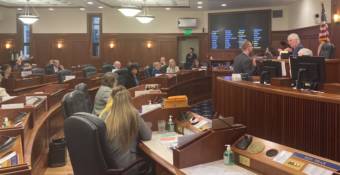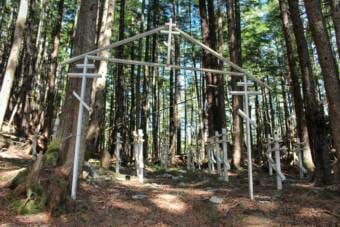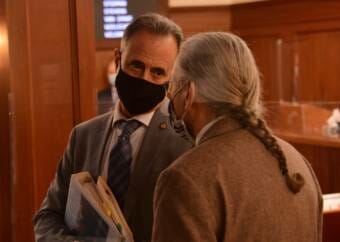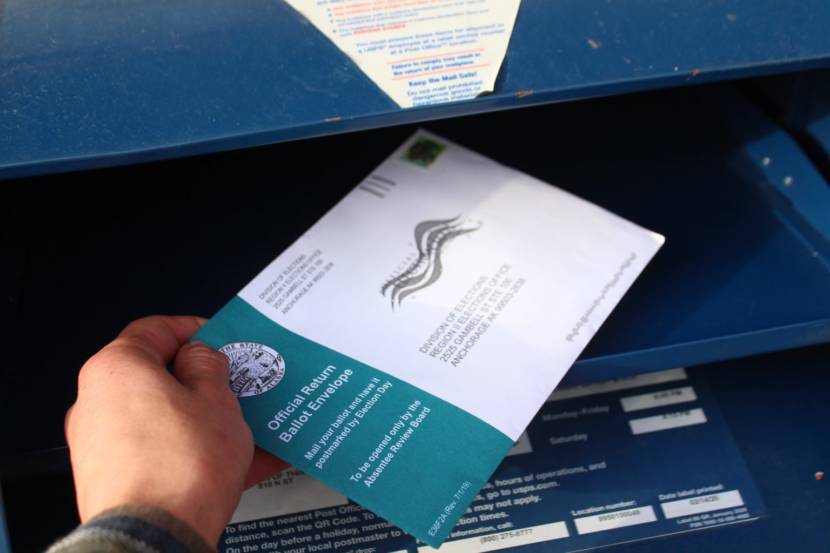
A national divide over how voters cast ballots has been reflected in the reactions to bills related to voter laws introduced in the Alaska Legislature this year. A Republican senator has proposed a bill he said would make elections more secure. But it’s raising concerns among advocates for making it easier to vote. They favor a bill proposed by a Democratic House member.
When it comes to any potential changes to Alaska’s voting laws, passions are running high. Senators recently heard that firsthand, during public testimony on voting legislation, including from Pamela Samash of Nenana.
“What makes America great is that we can vote,” she said. “But it’s worthless if it’s not a fair vote. And I don’t believe at all that last election was fair at all. I think it was completely rigged.”
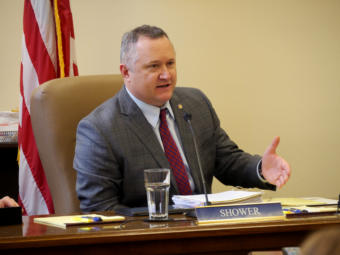
Wasilla Republican Sen. Mike Shower said he knows many voters have lost trust in the system and so he’s focused on improving the integrity of Alaska’s elections.
“This is a critical issue for the state and the country, that the citizenry gets back to a point where they can accept the election results,” he said.
Shower introduced a bill that would make many changes to how Alaskans vote, including introducing new technology in the form of something called “multi-factor authentication.” An example of this is when websites send users a code to their email or cellphone in addition to requiring their password to allow access. ‘
“We’re trying to drive ourselves to the point where we get into the 21st century, so that we use available technology to secure our elections, while making sure that we’re not putting up obstacles to people to actually be able to register and vote,” he said.
The measure, Senate Bill 39, also would require something similar to the blockchain technology used for cryptocurrencies like Bitcoin.
Other elements of the bill would add a potential penalty related to the requirement over who can witness voter signatures on absentee ballot envelopes. Currently, witnesses can be an official qualified to administer oaths. But if the voter believes that an official isn’t “reasonably accessible,” they can use any adult as a witness. Under the bill, a voter would commit perjury if they used a nonofficial as a witness when an official was available.
The bill would bar people from soliciting to help others mail their ballots, and would prohibit people from assisting mailing in more than six ballots. Shower has said he wants to prevent people who are paid to mail ballots.
And it would require municipalities that use the state registry of voters in their elections to also have multi-factor authentication.
People who want to make it easier to vote in Alaska have concerns about the bill.
They include Celeste Hodge Growden, the president of the Alaska Black Caucus, which advocates for Black Alaskans. She said adding multi-factor authentication would add an unnecessary step when there isn’t evidence of voter fraud in the state.
“I don’t see it being a problem here, and so why introduce legislation that makes it seems like there are issues when there really isn’t?” she said.
Hodge Growden said she believes some of the proposals in the bill are forms of voter suppression, especially the parts that could make it harder to help people mail-in ballots or find witnesses.
“The Alaska Black Caucus will do everything in its power to make sure it doesn’t become law,” she said. “We will no longer sit idly by.”
Shower has vehemently denied accusations of suppression, saying that his bill is intended to increase trust and includes some provisions making it easier to vote, like allowing voters to apply to receive mail-in ballots permanently.
Hodge Growden isn’t alone in having doubts about the Senate bill.
Kendra Kloster, the executive director for Native Peoples Action Community Fund, is also concerned. Her nonpartisan organization advocates for the well-being of Alaska Natives and encourages voting.
She said that changes to who can help voters mail-in ballots could prevent the kinds of help voters received last year when the pandemic made it difficult or dangerous for some people to return their ballots.
“We heard through this last election cycle communities really coming together, and tribal leaders and tribes working to help during COVID of course — when people were often staying home or in quarantine or in lockdowns — on how we could help get ballots,” he said.
She also noted that Shower has emphasized provisions of the bill that would encourage the Division of Elections to use more databases to update its records.
The state has an unusually large number of people living outside of the state who remain enrolled in Alaska — there are 585,961 registered voters and only an estimated 525,000 eligible voters. In part, that’s because state law allows people to remain registered here as long as they plan to return and do not register to vote elsewhere. But Kloster said the division could make progress on cleaning up its voting rolls without many of the proposals in the Senate bill.
She does like other provisions recently added to the bill, like the one allowing voters to apply to permanently receive mail-in ballots. It also would allow voters to fix errors on mail-in ballot envelopes that the Division of Elections finds that would prevent their vote from counting. This is allowed in some municipal elections but not in state elections.
Kloster offered support for a provision in the bill that would add tribal IDs to the list of forms of identification the division must accept. But she’s disappointed the bill would drop hunting and fishing licenses from that list.
Both Kloster and Hodge Growden prefer a different piece of legislation, House Bill 66, sponsored by Anchorage Democratic Rep. Chris Tuck.
It would provide a way for voters to apply to permanently receive ballots to vote by mail and for ballot curing. It would also allow voters to register and vote on Election Day, which makes it easier to vote, though their ballots won’t count until after the Division of Elections checks their eligibility. It would raise the pay of election workers, locking in the $3 per hour increase the division issued last year as an emergency measure during the pandemic. And it calls for the state to provide postage to cover the costs of mailing in ballots.
House Bill 66 is scheduled for a hearing in the House State Affairs Committee on Thursday. Senate Bill 39 is being considered by the Senate State Affairs Committee. State officials haven’t estimated the potential cost if either bill became law.
In addition to those bills, lawmakers are considering Senate Bill 83, introduced by Lt. Gov. Kevin Meyer, who oversees the Division of Elections.
Meyer’s bill would make smaller changes to the state’s election system. It would expand the division’s ability to audit election results. And it would allow entirely by-mail elections in communities of less than 750 residents, if the division is unable to hire election workers. Meyer said it’s been a long-running challenge to recruit election workers in some villages.
Meyer said last year’s election went well in Alaska.
He noted that some voters raised concerns about the effect of the vote-counting machines made by Dominion Voting Systems. But he said a statewide hand count of the Ballot Measure 2 results confirmed that the initial count was accurate.
“You know, having just gone through it, I think there’s enough check-and-balances in place that people should feel good about the elections, and the outcomes,” he said.
Meyer also noted that the larger House and Senate proposed bills would go into effect for next year’s election. He said it already will be a challenge to conduct the election without any major changes from these bills. That’s because there’s already a large overhaul to election laws from Ballot Measure 2, and the scheduled launch of new election maps from the census.
He said the Division of Elections should be able to give lawmakers input on what it would take to implement any major changes to elections.
While the House and Senate bills have some things in common, Kloster said they represent two different approaches to voting. And with the legislative session ending by May 19, there isn’t much time to resolve the differences this year.
